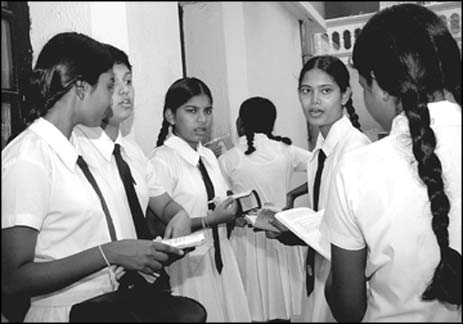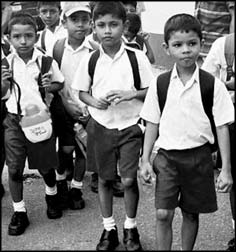What ails our education system?
by Indeewara THILAKARATHNE
Over the years it has been proved that Sri Lankans are innovative.
This is applicable to a range of activities including education.
The primary aim and objective of imparting knowledge and skills, have
been spelled out by philosophers and educationists. Broadening world
view, inculcating values and ethics in the tender minds of the students
and expanding the understanding of culture and civilisation are some of
the noble objectives of education. Building a balanced personality and
productive citizen should be the overall objective of a system of
education.
 It seems that the present system of education produces a generation
of men and women with little or no sense of values, ethics or
understanding of the culture and civilization. They have, eventually,
occupied diverse positions in different fields such as public service,
media, education, professions and civil organisations. Significantly
only a handful of persons are motivated by values, ethical standards and
public interest. It seems that the present system of education produces a generation
of men and women with little or no sense of values, ethics or
understanding of the culture and civilization. They have, eventually,
occupied diverse positions in different fields such as public service,
media, education, professions and civil organisations. Significantly
only a handful of persons are motivated by values, ethical standards and
public interest.
It is a well known fact that when societies abandoned their
traditions and system of values, they were in a state of instability.
Significant characteristics of an emerging social order is the birth of
a new system of values, norms and ethical principles that had to be
accepted as the very basis of the emerging social system.
New economic, social and cultural institutions had to emerge to guide
the social system in the making. Alternative perspectives of diverse
issues including those which directly dealt with existential issues were
to provide by science and reason. Traditional social structures began to
collapse against the backdrop of questioning the rationale behind them
and increasingly rejecting them. New political ideas led to the throwing
overboard the age-old traditional political institutions, adapting new
ones. In place of traditional social control and regulation, the modern
system of judiciary evolved, adapting more humane methods of correction
instead of its cruel counterpart under the old system.
The modern system of education has been evolved as a result of the
process of social transformation and not merely as means of transmitting
new ideas, values, ethics and worldview. It is a source of producing
knowledge and imparting skills that makes its recipients fit into the
new environment.
Modern institutional framework including industries, state,
bureaucracies, political institutions, new professions, media
institutions and universities require men and women upholding modern
ethical principles, socio-cultural values and sound knowledge and skills
in diverse fields.
Although it has not been an easy task to maintain a judicious balance
between skill-oriented education and a wider humanistic education,
professionalisation and training in diverse fields has been coupled with
purposeful proliferation of liberal arts education.
Children and youth even in most modern societies under the secular
system of education are influenced by diverse forces such as
ethno-centric and parochial world views, instrumentalist ethics
propagated by traditional social institutions and competitive economic
systems.
It is imperative that a range of social issues facing contemporary
societies such as inequality, discrimination, prejudices, corruption,
conflicts, violence and marginalization have to be taken into
consideration against this backdrop though they cannot be attributed to
education.
 The role of the system of education is critically important in
shaping attitudes, values and behaviours of individuals and groups
although it is important to consider the contribution of other
institutions such as the media, political parties, governments, business
and professions. In this regard the most influential aspect of education
is not the knowledge that a child acquires from a teacher and books but
socio-cultural practices within the educational institutions. The role of the system of education is critically important in
shaping attitudes, values and behaviours of individuals and groups
although it is important to consider the contribution of other
institutions such as the media, political parties, governments, business
and professions. In this regard the most influential aspect of education
is not the knowledge that a child acquires from a teacher and books but
socio-cultural practices within the educational institutions.
School segregation, selection of students, teacher-pupil
relationship, and role of religion, education institution and the medium
of instruction are all important aspects that influence the identities,
world views and attitudes of children and youth.
Such influence has a life-long effect on individuals. It is clear
that those who attended certain educational institutions tend to share
common values although there may be exceptions due to diverse external
influences. The important point is that sthe ystem of education should
be evaluated in terms of its content and how it is delivered as well as
its material deficiencies. For the future of the country is dependent on
the nature of products of the system of education in terms of their
social and cultural attributes as much as their capabilities.
(The article is based on a discussion with Prof. S.T Hettige of the
University of Colombo)
|

